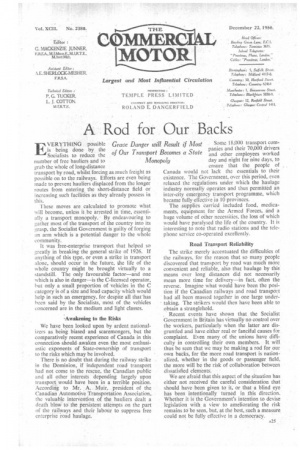A Rod for Our Backs
Page 27

If you've noticed an error in this article please click here to report it so we can fix it.
-F4 VERYTHING possible is being doneby the
Socialists to reduce the number of free hauliers and to grab the whole of long-distance transport by road, whilst forcing as much freight as possible on to the railways. Efforts are even being made to prevent hauliers displaced from the longer routes from entering the short-distance field or increasing such facilities as they already possess in this.
These moves are calculated to promote what will become, unless it be arrested in time, essentially a transport monopoly. By endeavouring to gather most of the transport of the country into its grasp, the Socialist Government is guilty of forging an arm which is a potential danger to the whole community.
It was free-enterprise transport that helped so greatly in breaking the general strike of 1926. If anything of this type, or even a strike in transport alone, should occur in the future, the life of the whole country might be brought virtually to a standstill. The only favourable factor—and one which is also in danger--is the C-licensed operator, but only a small proportion of vehicles in the C category is of a size and load capacity which would help in such an emergency, for despite all tharhas been said by the Socialists, most of the vehicles concerned are in the medium and light classes.
.Awakening to the Risks
We have been looked upon by ardent nationalhers as being biased and scaremongers, but the comparatively recent experience of Canada in this connection• should awaken even the most enthusiastic exponents of State-ownership of transport to the risks which may be involved.
There is no doubt that during the railway strike in the Dominion, if independent road transport had not come to the rescue, the Canadian public and all other interests depending largely upon transport would have been in a terrible position. According to Mr. A. Muir, president of the Canadian Automotive Transportation Association, the valuable intervention of the hauliers dealt a death blow to the persistent attempts on the part of the railways and their labour to suppress free enterprise *road haulage.
Some 18,000 transport companies and their 70,000 drivers and other employees worked day and night for nine days, to ensure that the people of Canada would not lack the essentials to their existence. The Government, over this period, even relaxed the regulations under which the haulage industry normally operates and thus permitted an inter-city emergency transport programme, which became fully effective in 10 provinces.
The supplies carried included food, medicaments, equipment for the Armed Forces, and a huge volume of other necessities, the loss of which would have paralysed the life of the country. It is interesting to note that radio stations and the telephone service co-operated excellently.
Road Transport Reliability The strike merely accentuated the difficulties of the railways, for the reason that so many people discovered that transport by road was much more convenient and reliable, also that haulage by this means over long distances did not necessarily mean more time for delivery—in fact, often the reverse. Imagine what would have been the position if the Canadian railways and road transport• had all been massed together in one large undertaking. The strikers would then have been able to obtain a stranglehold.
. Recent events have shown that the Socialist Government in Britain has virtually no control over the workers, particularly when the latter are disgruntled and have either real or fanciful causes for complaint. Even many of the unions have difficulty in controlling their own members. It will thus be seen that we may be making a rod for our own backs, for the more road transport is nationalized, whether in the goods or passenger field, the more will be the risk of collaboration between dissatisfied elements.
We are afraid that this aspect of the situation has either not received the careful consideration that should have been given to it, or that a blind eye• has been intentionally turned in this direction. Whether it is the Government's intention to devise legislation with a view to ameliorating the risk remains to be seen, but, at the best, such a measure could not be fully effective in a democracy.




















































































